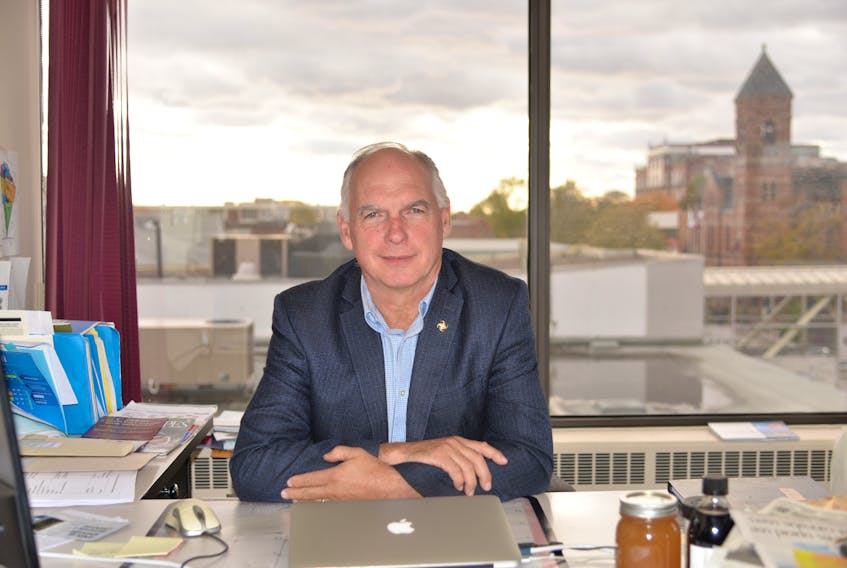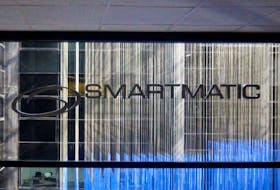It’s become a familiar message on the Island – that a company doesn’t have to be in Toronto or Montreal or Vancouver to be globally successful in the biotech sector.
And, it was a message that Rory Francis, executive director of the P.E.I. BioAlliance, reminded an audience of earlier this month as he stood at a podium at Holland College and presented the Charlottetown-based BioVectra with the BIOTECanada Gold Leaf award for top company.
BioVectra is one of roughly 54 companies in the P.E.I. BioAlliance, a private sector-led, not-for-profit organization that develops and coordinates the growth strategy for the Island’s bioscience cluster.
Francis launched the organization in 2005 with around 10 early stage biotech companies, including Diagnostic Chemicals Limited. BioVectra evolved from Diagnostic Chemicals as did another P.E.I. BioAlliance member – Sekisui Diagnostics, which was recently named a top-100 employer in Canada for the second year in a row.
Originally from Fortune Bridge, P.E.I., Francis has an undergraduate degree from Mount Allison University in geology and chemistry and a master’s degree from the University of Waterloo in hydrogeology.
He worked for the province from 1991 to 2008, including in 1997 and 1998 as the deputy minister of agriculture when the idea of creating “something in the life science area” was discussed as a new economic development opportunity.
That led to the creation of the Belvedere Life Science Research Group involving organizations such as UPEI, the Atlantic Veterinary College, the Canadian Food Inspection Agency and the Food Technology Centre (now Bio Food Tech), to name a few. The creation of the group was intended to foster collaboration between entities that normally didn’t talk to each other, explained Francis.
Then, a group comprised of then premier Pat Binns, Wade MacLauchlan (who was at that time the president of UPEI) and ACOA convinced the National Research Council to establish a research institute in Charlottetown. And, with the credibility of the NRC’s eventual presence (in 2007), Francis, who had moved on to deputy minister of health and social services, was approached in 2004 by that same group to form “this nascent bio something entity.”
Besides the growth from around 10 biotech companies to 54 companies today, sales have also quadrupled to more than $250 million and 1,600 people are working in the sector.
“We’re out of space …We’re at a real risk of not being able to land companies here, who we’ve been working on for two or three years, usually early stage companies.”
-Rory Francis
Francis said keys to growing the sector were a good plan and an “alignment of vision” from academic leaders, government and the business community as well as understanding that a long-term commitment was required. He explained that it takes time to commercialize new products and technologies and establish credibility as a location for companies to grow and thrive.
“It’s not going to be an overnight success. These things take time,” he said.
Francis said one of the drivers for the sector’s growth – both in terms of existing companies as well as attracting new companies – was the creation of the Emergence Bioscience Business Incubator program about five years ago that is headed by Martin Yuill. The national program supports, mentors and advises about 65 startup and growth stage companies (including about 25 from P.E.I.) to bring their products and services to the market.
But, growth can present challenges.
“We’re out of space,” said Francis.
He explained that the lack of space involves specialized space that meets regulatory approval, such as from Health Canada, the Canadian Food Inspection Agency or the Food and Drug Administration, in order to manufacture products or perform research and development.
“We’re at a real risk of not being able to land companies here, who we’ve been working on for two or three years, usually early stage companies.”
Francis said what is needed is a new facility in the BioCommons Research Park. There are plans to meet this need, but they still need financing.
Overall, Francis said the Island’s bioscience sector has proven that it is, and will be, “one of the pillars of the evolving economy.”
With plenty of room to grow.
“It’s taken 14 years. Frankly, I think we’re just at liftoff. It’s been good, but we’re just getting started.”









